 EDITOR'S PICK
EDITOR'S PICK
Trio of Ex-Tesla Employees Start EV Charging Company in the UK After Elon Musk Fired Everyone
18 Aug 2025 | Synopsis
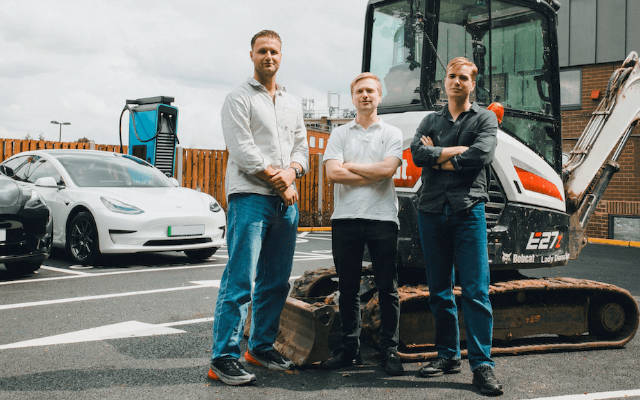 After Elon Musk abruptly fired Tesla's entire Supercharger team, three ex-employees launched Hubber, a UK-based EV charging startup focused on high-speed urban hubs for taxis and delivery fleets. Leveraging their experience deploying over 1,200 chargers, they aim to fill the urban fast-charging gap. Backed by £60M (~$81M), Hubber's first site opens August 20 in South London with 12 bays and up to 300kW chargers.
After Elon Musk abruptly fired Tesla's entire Supercharger team, three ex-employees launched Hubber, a UK-based EV charging startup focused on high-speed urban hubs for taxis and delivery fleets. Leveraging their experience deploying over 1,200 chargers, they aim to fill the urban fast-charging gap. Backed by £60M (~$81M), Hubber's first site opens August 20 in South London with 12 bays and up to 300kW chargers.Rivian's Also: A Billion-Dollar Bet on Small Electric Vehicles
18 Aug 2025 | Synopsis
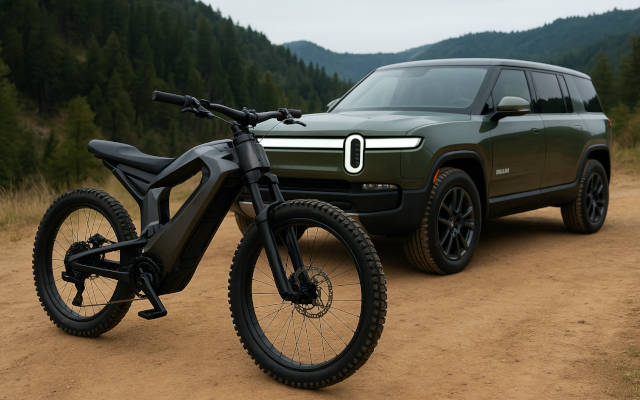 Rivian's spin-out, Also, is a billion-dollar bet on premium small-format EVs like e-bikes and scooters. Incubated as "Project Inder," it's now a standalone company backed by Greenoaks Capital. With design input from Jony Ive's LoveFrom and Rivian's tech, Also aims to bring connected, stylish micromobility to urban markets. Though no products are launched yet, its strategy blends Rivian's infrastructure with startup agility..."
Rivian's spin-out, Also, is a billion-dollar bet on premium small-format EVs like e-bikes and scooters. Incubated as "Project Inder," it's now a standalone company backed by Greenoaks Capital. With design input from Jony Ive's LoveFrom and Rivian's tech, Also aims to bring connected, stylish micromobility to urban markets. Though no products are launched yet, its strategy blends Rivian's infrastructure with startup agility..."Ben & Jerry’s Ditches ICE For Rivian’s Van
18 Aug 2025 | Synopsis
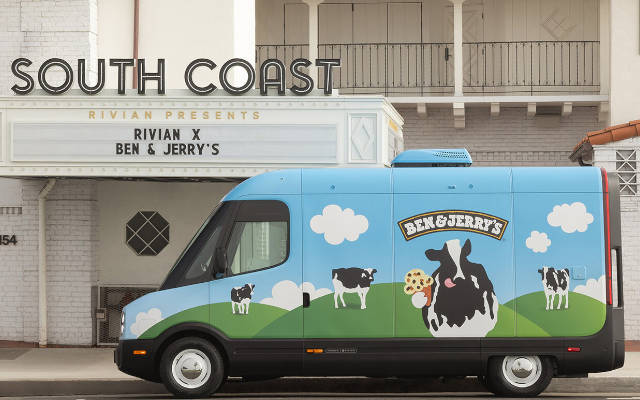 Rivian and Ben & Jerry’s have teamed up to create two all-electric "scoop trucks" built on Rivian's Commercial Van platform. Debuting at SXSW in Austin, the eco-friendly vehicles boast a 161-mile range and combine refrigeration and serving windows inside. After the launch, they'll travel nationwide...to bring scoops with less noise, emissions, and fossil-fuel reliance...showcasing Rivian's commercial EV versatility..."
Rivian and Ben & Jerry’s have teamed up to create two all-electric "scoop trucks" built on Rivian's Commercial Van platform. Debuting at SXSW in Austin, the eco-friendly vehicles boast a 161-mile range and combine refrigeration and serving windows inside. After the launch, they'll travel nationwide...to bring scoops with less noise, emissions, and fossil-fuel reliance...showcasing Rivian's commercial EV versatility..."10 Hot Electric Vehicle Deals Where Battery Range Meets Affordability
17 Aug 2025 | Synopsis
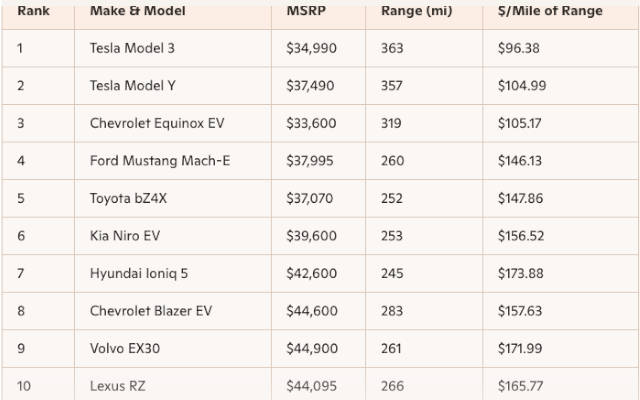 For 2025, several EVs balance affordability and range. Forbes highlights 10 models under $45K with at least 245 miles per charge. Top values include the Tesla Model 3 ($34,990/363 mi), Tesla Model Y ($37,490/357 mi), Chevy Equinox EV ($33,600/319 mi), Ford Mustang Mach-E ($37,995/260 mi), and Toyota bZ4X ($37,070/252 mi). But if you're looking for more "bang for the buck" in range, MS Copilot LLM created the above table for EVWorld.com.
For 2025, several EVs balance affordability and range. Forbes highlights 10 models under $45K with at least 245 miles per charge. Top values include the Tesla Model 3 ($34,990/363 mi), Tesla Model Y ($37,490/357 mi), Chevy Equinox EV ($33,600/319 mi), Ford Mustang Mach-E ($37,995/260 mi), and Toyota bZ4X ($37,070/252 mi). But if you're looking for more "bang for the buck" in range, MS Copilot LLM created the above table for EVWorld.com.Volkswagen Delivers The 1.5 millionth All-Electric ID. Model
17 Aug 2025 | Synopsis
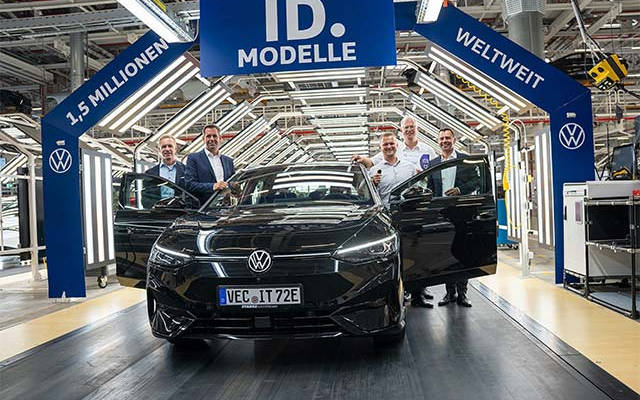 Volkswagen just delivered the 1.5 millionth all-electric ID model, a black ID.7 Tourer Pro, at its Emden plant in Germany, marking a major milestone in its electromobility push. The car, boasting a range of up to 606 km, was handed over in the presence of VW executives and Lower Saxony's Minister President. Emden - Sone of only three VW factories fully dedicated to EVs - reflects over €1 billion in investment.
Volkswagen just delivered the 1.5 millionth all-electric ID model, a black ID.7 Tourer Pro, at its Emden plant in Germany, marking a major milestone in its electromobility push. The car, boasting a range of up to 606 km, was handed over in the presence of VW executives and Lower Saxony's Minister President. Emden - Sone of only three VW factories fully dedicated to EVs - reflects over €1 billion in investment.
 Si Exclusive
Si Exclusive
Hydrogen's Flight Path: Fuel Cells, Turbines, and the Economics of Clean Aviation
10 Oct 2025 |  Aviation is shifting from Jet A to four fuel systems: electricity, hydrogen (fuel cell and combustion), SAF, and petroleum. Fuel cells suit short-haul aircraft; hydrogen combustion may power long-range jets. SAF bridges legacy fleets. Hydrogen costs - $5-$7/kg today, possibly $2/kg by 2040 - impact ticket prices and infrastructure decisions. Airport authorities, airlines, and governments will share deployment costs. Each fuel has distinct environmental pros and cons shaping aviation's net-zero future.
Aviation is shifting from Jet A to four fuel systems: electricity, hydrogen (fuel cell and combustion), SAF, and petroleum. Fuel cells suit short-haul aircraft; hydrogen combustion may power long-range jets. SAF bridges legacy fleets. Hydrogen costs - $5-$7/kg today, possibly $2/kg by 2040 - impact ticket prices and infrastructure decisions. Airport authorities, airlines, and governments will share deployment costs. Each fuel has distinct environmental pros and cons shaping aviation's net-zero future.
 11 Oct 2025 00:44:58 UTC |
RECENT PODCASTS
BYD Soars - Cheaper Tesla Models - The Bolt is Back - Rivian
SEARCH RSSTREAM
 53 New Postings In Past 24 Hours
53 New Postings In Past 24 Hours
Category:finance
Region:NoAmerica
Date:10 Oct 2025
Category:policy
Region:NoAmerica
Date:10 Oct 2025
Category:mobility
Region:AsiaPacific
Date:10 Oct 2025
Category:mobility
Region:AsiaPacific
Date:10 Oct 2025
Category:finance
Region:NoAmerica
Date:10 Oct 2025
Category:finance
Region:IndoAsia
Date:10 Oct 2025
Category:energy
Region:Global
Date:10 Oct 2025
Category:energy
Region:NoAmerica
Date:10 Oct 2025
Category:finance
Region:NoAmerica
Date:10 Oct 2025
Category:finance
Region:Global
Date:10 Oct 2025